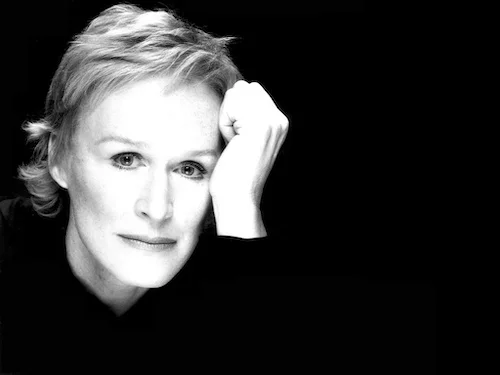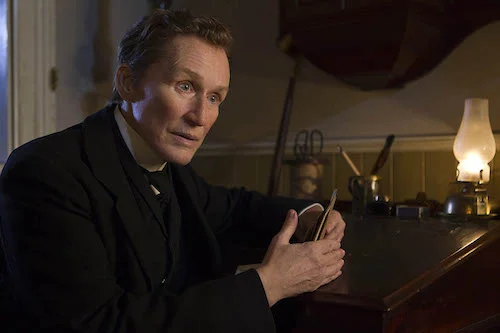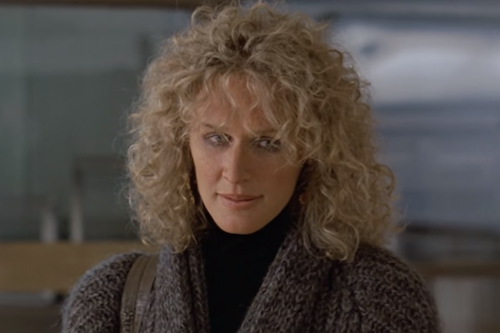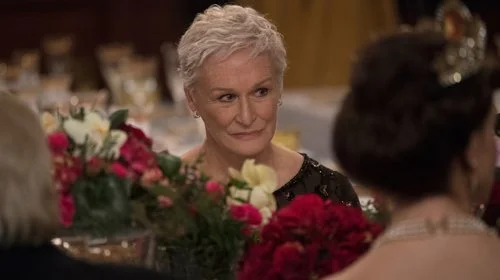The Continuous Importance of Glenn Close
I don't know what it is, but you look at the pantheons of great performers, and somehow Glenn Close has always kind of snuck in but never been as truly appreciated as she should be. Yes, she gets mentioned. She even gets an Academy Award nomination here and there. She gets praised often. But, when people bring up Meryl Streep or Gary Oldman (and the like) as being the best of the best, why isn't Glenn Close included more often?
I think this might have to do with Close choosing roles that might not be as flashy to the masses. Streep can be nominated for awards for the umpteenth time, and people will wonder how she did it. It feels like whenever Close gets some sort of accolade or nomination, it's as if Aunt Glenn has come back to town to steal the spotlight from some other star, for some work that no one has seen no less. Wasn't that the case with Albert Nobbs? Let's be real. Albert Nobbs wasn't a great film. Neither was The Iron Lady. Yet, when people think of the latter film, they remember the incredible performance by Streep (as Margeret Thatcher) that bolstered the mediocre film to renown status. I don't believe that anyone was going to beat Streep that year (her third Oscar win ever), but why was Close in Albert Nobbs just completely disregarded when it came to discussions?
Close performed as the titular character: a female in Ireland during the 19th century who has disguised herself as a man for decades in order to live a life of self reliance and independence. In order to pull off this performance (tactfully, powerfully, naturally), you might just have to be Glenn Close. Like The Iron Lady, there aren't many reasons to visit Albert Nobbs, but Close is certainly the main reason. We can look at her other nominations to try and figure it all out. We start with her minor -- but crucial -- performance in The World According to Garp (a Robin Williams flick you may have forgotten existed). Following that we have The Big Chill, (who could forget The Big Chill?) and then The Natural (still Best Supporting Actress nods so far). Her second Best Actress nomination was for Dangerous Liaisons, and her third is after a large leap into the new millennium with Albert Nobbs.
Albert Nobbs
The only film Close has been nominated for that may have been on everybody's radar (and still is, even for the more casual cinema goers), is the controversial thriller Fatal Attraction, where Close finally moved up to the Best Actress category. We all remember Alex Forrest (if you don't, I won't give away any spoilers here). The thing is, almost every Close performance carries this kind of a punch (even without the disturbing and taboo subject matter).
Close seemingly takes charge in her own films, but rarely makes a splash to those that aren't paying attention. There is something about her work that never forces you to watch, but you are rewarded when you give her a chance. Sure, Close has played some popular and intriguing roles that may have peaked the interests of movie lovers. Remember when she was Cruella De Vil come to life? What about when she took part in Mars Attacks! of all films? Did anyone even recognize her as Gutless in Hook?
Fatal Attraction
Aside from these examples (and numerous others), Close treats the screen like the stage. She draws you deep into her soul with as little as possible when she needs to set off a charge to explode a scene, you had better believe that she does. She gets the human psyche. She knows what makes us tick, whether it’s the throbbing pulse of madness, or the patience that comes with earnest care. She understands timing, volume, inflection and purpose. All of this might be because of her extensive theatre background (one of which precedes her film presence). She received her first Tony nomination all the way back in 1980 (for Barnum: a musical based on P. T. Barnum, naturally). She won her first Tony in the early ‘90s for her portrayal as Norma Desmond in a stage adaptation of Sunset Boulevard; clearly, ten years was all she needed to get the heart of cinema inside and out. She currently stands as the current living actor to hold the most Academy Award nominations, and not have a single win.
The Wife
All of this brings us to The Wife; the shoulder-shrugging mediocre film that, once again, is worth the price of admission for Close (and even costar Jonathan Pryce, but this is mainly Close’s show). When I created Films Fatale (this very site you are reading this article on), The Wife was exactly the film I had in mind when I created the “Acting Vehicles” review category. I felt that people needed to know that some films deserve a chance just to see what they are centred around: their key performer(s). The Wife has a great premise but less than stellar execution (let’s not even bring up the irritation of son David’s worst timing and tantrums ever). What nails its message on equality, the sacrifices of women, and the unfair injustices people have had to face when it came to following their careers? Of course, it is Close, who delivers a great performance. I can’t even flat out call it the performance of her career, because I’ve clearly made my point that she has many roles that are outstanding. What I can say is that it is likely her most important role of her career. Like Albert Nobbs, The Wife features a woman forced to live in the shadows just because of her gender. When Close won the Golden Globe for Best Actress in a Drama, she dedicated her win to her mom who was never allowed to chase her dreams the same way Close did (and that’s only because Close fought against the system time and time again). This, like many of the films she takes part in, means something to her. That’s why she takes them. Isn’t it worth a damn to see her giving her all time and time again?
Glenn Close is undervalued, because she works for herself and for her passion, whether it be film, theatre, or television (let’s never forget her commanding importance in The Shield and Damages). Her projects rarely scream at you to watch them. The majority of her best roles are smaller works that don’t really push their way into pop culture too greatly (outside of The Big Chill and Fatal Attraction when it comes to her nominations). If we were to compare actors to crafts shows, Close is the family run one-of-a-kind booth that just sets up shop, waits for customers, and gives every inch of gratitude, care, and effort towards anyone that comes by to see what she has. She is unassuming, but that should not deter you from giving her the time of day. If this tome of an article dedicated to an acting legend (there, I said it) is to teach you one thing, it’s that Glenn Closes’ time is not now (just because of the awards season steam The Wife has generated): it always was, and it isn’t too late to check out the many reasons why.
Andreas Babiolakis has a Masters degree in Film and Photography Preservation and Collections management from Ryerson University, as well as a Bachelors degree in Cinema Studies from York University. His favourite times of year are the Criterion Collection flash sales and the annual Toronto International Film Festival.





